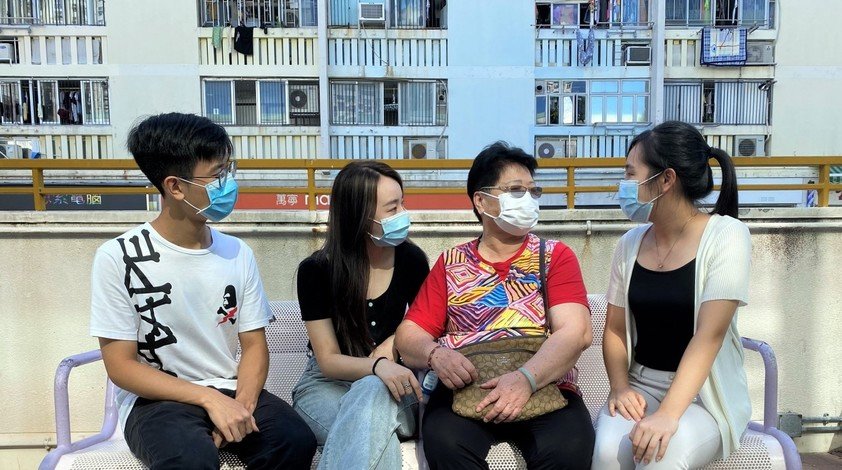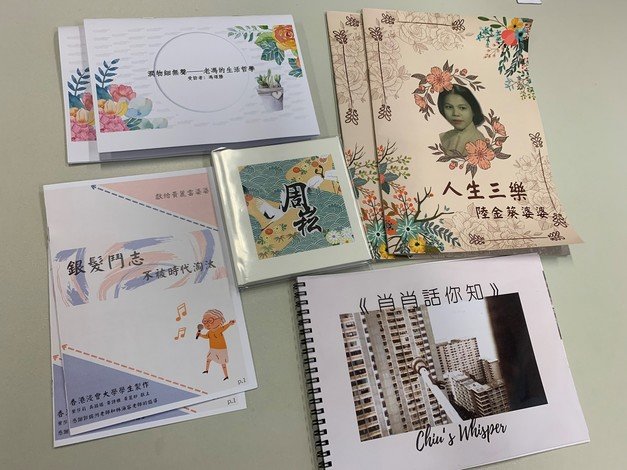Discover HKBU
Preserving precious heritage through oral history
31 Aug 2021
It's easy to get lost in the Wah Fu Estate. Built in 1967, the sprawling public housing development is like a mini-town with its own library, shops and cafes, and by 2016, the 18 residential blocks housed around 27,000 people. It is still home to many grassroots families who have lived there for decades, and the 73-year-old Granny Lam Lingling, like many older residents there, has witnessed the changes in the neighbourhood's culture, customs and people over time.
Today, however, Wah Fu's fate has already been sealed, as the Government announced in 2014 that the whole estate is to be gradually redeveloped. Granny Lam and her neighbours will have to move out and relocate.
To capture and preserve the history and memories of Wah Fu before its demolition, a group of HKBU students conducted an oral history project, wherein they interviewed elderly residents and re-told their life stories through different mediums. The students aimed to discover and record traces of this historic Hong Kong estate that reflect various aspects of grassroots life, such as the working patterns, family roles, types of entertainment and more.
The project is part of an interdisciplinary General Education Capstone Course titled "Implementation of Service-learning Engagement through Chinese Storytelling and Writing", which is jointly offered by the Department of History and the Language Centre. Sponsored by the Tin Ka Ping Foundation, the course provides an opportunity for students to design and implement a service-learning exercise, putting knowledge and theories into practice. It also cultivates a sense of social awareness and social responsibility among students. Ms Vienna Lam, Assistant Lecturer of the Language Centre, and Dr Daniel Kwok, Lecturer of the Department of History, are the two leading instructors.
A total of 78 students from nearly 20 different departments enrolled this year. Upon completion of a 12-week training programme that comprised lectures and volunteer service preparatory workshops, the students were divided into two teams to conduct the interviews with the elderly residents in Wah Fu and Wong Tai Sin in March 2021. Subsequent to the interviews, the students put their personal service-learning experience down in individual online journals. In addition, students produced either Chinese booklets containing interviewees' stories, old photos and modern images of the neighbourhood, or multi-media works presenting scenes and stories from the interviews in the forms of video, soundtrack and cartoon.
The students found the course tremendously rewarding, as the project has not only improved their understanding of storytelling and writing methods and skills pertinent to oral history, but also enriched their knowledge of the relationship between transformations in the two communities and their interviewees' lives over the years. Some also found that oral history fills in the gaps in certain vague parts of ordinary history books and has its unique value because, for example, Granny Lam's accent and spoken cultural terms can be captured by means of video.
From the instructors' perspective, oral history serves a significant educational purpose in this course. Dr Daniel Kwok pointed out that the students, by listening to the interviewees and writing stories, were offered the opportunity to not only reflect upon Hong Kong's social and cultural past, but also become the inheritors of the wisdom and experience of the older residents. Ms Vienna Lam noted that the impact of this course goes two ways: students may better understand the history of Hong Kong and the life of grassroots people, while the elderly residents benefited from the students' care amid the pandemic and were able to learn to use video meeting software.
Oral history interviews and writing are meaningful methods for recording history. Granny Lam's story is emblematic of the experience of a social group that has shaped and lived through Hong Kong’s seismic social and economic developments. Inarguably, by preserving the memories of iconic communities that will soon disappear, the outcome of this project will benefit and inspire present and future generations.

